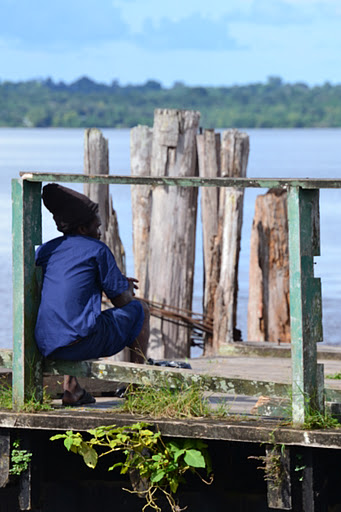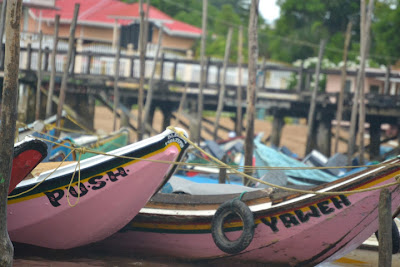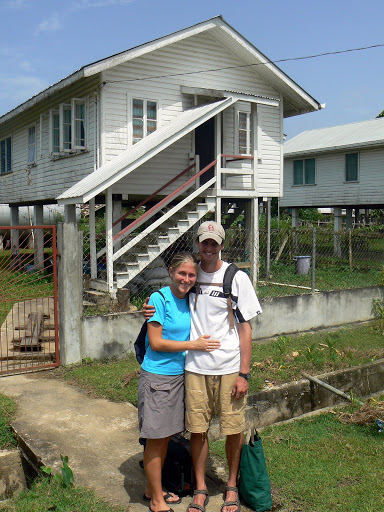 |
| Bartica, Guyana photo by Katie Watkins |
By Katie Watkins, Guyana, 2006-2008
I watched the live footage from the local television station. What I saw on the screen would have never been shown on U.S. television, the images too graphic, too raw, too disturbing. If by chance it had, I could imagine the newscaster warning the viewers, "the images you are about to see are of a graphic nature and may be inappropriate for children."
Here, there was no warning.
No time for censure.
The camera zoomed in on each body one by one, resting for several seconds on each face, slowly panning over each section. I stood in front of the television; a tea kettle steamed on the stove, the other burner occupied with two eggs over-easy. Two egg whites, one yolk removed.
The bodies were piled in the back of a vehicle, the hospital's all-purpose Landcruiser. It had been used as an ambulance in the rare case of emergency, although most had accepted that any serious injury or condition suffered in Bartica would most likely result in death. The nearest trauma facilities a bumpy hour-long boat ride away, it was easiest to rationalize death sustained from a heart attack or complications during labor as "God's will" or "her time to go."
Under normal circumstances, the bodies would not have been treated this way, stowed away like cargo. An event like this had never happened in Bartica; there was no time for ritual. I scanned the corpses, noticing their bizarrely bloated limbs, sparsely covered legs swollen in the heat. Some arms were frozen in mid-air, one final gesture of protest. I ignored the extremities; my eyes focused on the faces, making note of those which seemed somehow familiar. I stared into their eyes opened wide. Not a look of surprise or disgust or even pain. In the eyes I saw terror.
I jogged my memory trying to recall how I might have known any of them. How often had I had performed this same exercise before? I'd see someone in the grocery store, unable to remember how I knew them. From school? Work? Maybe someone who walked his dog in the park while I ran? Then later, sometimes days later, it would suddenly click, and I would identify my mystery person, congratulating myself for solving the puzzle. I took mental pictures of the faces, looking for any clues which might lead me to identification. I panicked, as if failing to recognize someone I knew right there on the spot was somehow irreverent, one last blow of betrayal. Like most other people in the town, I was doing the same thing, standing in front of my television, numb, in shock. I, like my neighbors, was scavenging the heap, bracing myself to see a friend lying among it. A nagging pang of guilt seeped through, sickening my stomach as I allowed myself to exhale in relief. I knew no one personally. They belonged to someone else.
I could easily have gone and seen for myself. It was in my backyard, after all. We had lain awake, knowing precisely the sounds we were hearing, pretending that we didn’t. For over an hour it was the same. A car would speed past the front of our house into the hospital entrance, screeching to a halt. The doors forcefully swung open, and the body was pulled from the tiny backseat. Footsteps skittered across concrete, an irregular rhythm of legs straining to hurry, struggling to keep up with the weight being carried. Minutes later, the tires squealed and the car sped away, escaping into the balmy night air. And then another car. And another. And more.
Until I could predict the sound I would hear before it happened, the staccato taps of the shoes echoing in my ears long after the last door slammed. I thought to myself how odd it was to hear these sounds with no voices attached to them. Even more eerie was the unmistakable panic that screamed in the acceleration of the engine, the fright throbbing in the frantic footsteps. No words were needed. The noises spoke for themselves.
We heard later that many died not from fatal injuries, but simply from bleeding out. It would not have taken doctors to save those lives, only hands. Any hands. Our hands. In those critical moments, the dying outnumbered the living. Lying in silence, our backs gently pressed, our eyes refused to make contact, avoiding the expressions we might see if we turned our heads. A cool breeze whispered through the room, lifting the curtain from the window. I watched it flap back and forth, eventually resting on the windowsill. I felt his back quiver slightly, his chest exhaling into the stillness of the night. I knew he heard it too.
 |
| Katie Watkins, bottom row, third from the right |
Sunday, the day before, had been a special day, one that we had looked forward to for almost two years.
Our village was celebrating the grand opening of a community greenhouse, the finale to a project that I had introduced to the community. For over a year, this project had been my life, from garnering community support and writing a grant, to constructing the structure and planting our first crop of vegetables.
In preparation for the event, we had held planning meetings lasting several hours, with fiery debates over details that seemed unimportant to me, but meant everything in the world to the group. Cupcakes or sliced cake? Should the food be served on paper plates or packed in plastic bags that could be easily prepared and shared? Should there be a limited number of invitations distributed, or would my “more the merrier” approach result in the ultimate nightmare and shame of a Guyanese hostess: having to turn guests away without food?
Green t-shirts would be cheaper to purchase, I had argued. “Oh, but Katt-y, we must look nice! We will pay for de’ shirts wit’ collars!” they had insisted. Looking back, I realized that this bickering was a product of the extreme pride my friends felt in being a part of the project. They wanted it to be perfect, for themselves, for their community, and for me. I saw it on their beaming faces, blushing with modesty as I complimented their individual efforts when introducing them to my “town people” who had traveled from the capital for the event, including the Peace Corps country director and the acting U.S. Ambassador to Guyana. The greenhouse teemed with ripe produce ready to harvest and sell to the crowd who marveled at how beautiful the greens were. I made a speech to over a hundred people, thanking my friends for working so hard and for making my two years in Guyana ones that I would remember forever.
“Don’t worry, we will never forget you,” I said with tears in my eyes. And I meant it.
With dusk approaching, the guests began to disperse. The “town people” wanted to be sure to catch a boat back to Georgetown before dark. Everyone knew it was not smart to be on the water at night.
We declined offers to catch a taxi back home, looking forward to the mile-long downhill stroll back to Front Street. The sun was beginning to set, and the subtle drop in temperature cooled the air just enough for comfort. Dusk had always been my favorite time of day. The sun lazily setting over the river, I liked how the sky seemed to slowly unwind in front of me. We had spent many evenings enjoying this tranquil show, sitting quietly by the river sipping cold beers and watching swarms of children splash and play in the murky brown water.
The eldest child of each cluster passed around a bar of soap, the refreshing swim doubling as the day’s bath.
But tonight would be different. Two of our best friends had traveled in from their villages for the weekend. We splurged at our favorite Brazilian restaurant, hungrily filling ourselves with salty beef and sausage sliced from a gigantic skewer slow-cooked on a massive charcoal grill. Tapping our feet to the festive beat of reggae music blaring throughout the riverfront bar, we finally allowed ourselves to relax. Generously treating one another to rounds of beers, we talked and joked and laughed away any stress or worry that might have remained from the day, and symbolically, from two years. Peeling the cool soggy label from my bottle, my thoughts wandered from the group and I paused briefly to take it all in.
I thought of the two years, packed full of tragedy and heartache and, equally, with joyous memories like this one. My eyes met Paul’s and we smiled slightly, as we often did in crowds. Our affection had always been discreet. This was our secret acknowledgement, so subtle that only we were meant to notice it, so special that only we could understand it. “This is it,” I thought. “This is how I want to remember it.”
 |
| photo by Katie Watkins |
That next morning, when the urgent sounds of engines and footsteps finally stopped, we took our time packing, reassuring the worried voices on our constantly ringing phones that we were safe and would leave as soon as we could catch a boat.
I dawdled, stalling our departure, fixated on the insignificant. I took a long cold bucket bath.
I sorted through my books, choosing ones I knew I would not read but had been meaning to.
I watered my plants. I packed only enough clothes for a weekend, snapped at Paul when he suggested we cram our “must-keeps” into our enormous hiking packs we had not touched since we moved in.
He knew that we might not be coming back. I disregarded his voice of reason, convinced that four pair of underwear and a travel-size shampoo would be plenty.
Though the sky was clear and sunny that morning, a haze seemed to fog the street, blanketing those who stumbled along it with a cloud of disorientation. People milled about aimlessly in a sluggish stupor, their eyes hollow and sullen. They walked with no particular purpose, dazed and speechless. Puddles of blood still remained pooled in the street, slowly drying in the mid-morning sun. Broad red streaks smeared across a collection of bullet holes on the side of a building, evidence of casualty.
I noticed that not everyone was out. I knew many people were still in their homes, either too terrified or too distraught to open the door. I decided that there must be two categories of survivors.
One group was drawn to the presence of others. Even if in no direction, they had to move, and needed to see others moving too. Moving reassured them they were still alive. They wanted to confront the aftermath head-on, needed to see the devastation with their own eyes to accept that the bad dream was real. The others chose isolation, would rather grieve quietly in solitude. They wanted nothing more than to shut out the despair by locking the door and hunkering down to wait it out in the corner. Although well aware of the tragedy, seeing pain so fresh would have sent them over the edge. This group tuned out the horror around them so that they could listen to their own hearts beating, could hear themselves breathing. Breathing reminded them they were still alive. They knew they would have to come out eventually, but at that moment they could not bear the thought of their weeping being overheard. I told myself that if given the choice, I would have joined the latter group.
They came in quietly, late at night by boat, an intentional plan to catch the town off guard during a long-anticipated cricket match between Guyana and Antigua. The excitement had been building for weeks. Groups of families and friends made plans to gather together to crowd around televisions in tiny living rooms to cheer on the Guyanese squad.
Their first victims were a small boat with five men who had stopped to sling their hammocks for the night. Their faces pressed against the splintered wood planks of the dock, they were shot execution style one by one. A team of boots stomped carelessly across three scarlet puddles.
At 9:40, they shot the officers on duty at the police station. Splitting into teams, some took over the town’s police vehicle and cruised down the street shooting from the windows. Others traveled by foot, shooting indiscriminately, their occasional shots to the sky aimed at intimidation.
A ragged bible would later be found among peanut butter and flashlights in the group’s jungle camp, the pages yellowed with water damage.
A 15-year old girl selling candy with her mother dropped to her knees, pleading for her life. She felt the foreign sting of a bullet grazing her left foot, the achy sensation unable to distract her from what surrounded her. She saw death littering the street her young knees rested upon, an image she wished she could have been spared from too. Hearing the crescendo of gunshots, an elderly man scurried to huddle in the horizontal freezer of the gold mining business he was guarding. His hiding place discovered, the old man’s body crashed to the bottom with a thud, as the men ran past with safes of gold and guns. Before leaving, they pointed their guns to the security cameras hanging on the wall.
Just a few blocks away, the festive mood that had begun at dusk continued into the night as we watched the cricket match with a group of friends. Our jovial voices joined the boisterous symphony of cheers heard throughout the town, as Guyana dominated the game.
A series of snaps popped outside in the distance, sounds we assumed to be firecrackers set off by kids celebrating the approaching victory. Cell phones began to ring, and the room buzzed with scrambled scraps of news that the police station had been shot up and that gunmen were moving through the street killing people. Even as I heard the truth unfold, I ignored the distinct irregularity of the pops, refusing to believe what later seemed so obvious, that this sound could not come from a firecracker.
I had heard gunshots before, but never ones directed at bodies.
I thought this type of gunshot should somehow sound different, that the enormity of its consequence would somehow resonate boldly in the atmosphere for all to recognize. But it did not.
Tuning out the horror taking place around us, our party continued. We tried to resume our conversations where they had left off, filling the awkward silence with nervous jokes and distraction.
What else could we do?
I would like to say I reacted differently, the way one should respond to something so horrific. My friend suggested we take cover under the table just in case the gunmen chose our street next. I laughed sarcastically at her, a tactless response she may have shrugged off, but one that I still wish I could take back. I thought later of Hotel Rwanda, a movie I had seen about the Rwandan Genocide just before leaving for Guyana. The main character drives his car over an unusually bumpy road, only to find out that he is actually driving over hundreds of dead bodies. He gets out of the car and instantly vomits when he sees the horror before him.
I wanted to feel fear, to feel my senses heighten, to feel the fight or flight response I had read about in books. I should have been appalled, disgusted, traumatized. I wanted to feel.
Something.
Feeling would have validated that the gunshots had not been mere random blasts in the darkness, that they had destroyed real human lives. Instead, I felt nothing. Numb.
On that night, twelve people were massacred. This number was added to the eleven that this same gang had slaughtered in another village just three weeks before, kicking down the doors of homes and murdering entire families.
On that night in Bartica, approximately 184 shots rang out, some disappearing into the night sky, and others splitting skin and skulls.
And those were just the shells that were found. I know there must have been more.
On that awful night, I laughed. I drank rum. I celebrated. I pretended. My body remained, still breathing, living, thriving. But inside, I felt a part of me dying, slowly decaying in disgrace for what I should have felt but could not.
Coming tomorrow, the conclusion to Katie's series: ... I wanted to feel all that I had not been able to take in before. Dissociation, I learned, is not a selective skill. In the process of numbing myself to all the pain I saw in Guyana, I had also muted the pleasure. I felt pick-pocketed of innocent, untainted, simple joy. And I wanted it back. I wanted to see for myself that while the horror I had witnessed was part of my experience in Guyana, it was not all of Guyana, and I did not have to let it define my experience. I wanted to make some new memories, and fill in the blanks of those that seemed so fuzzy. And I knew I could only do this by going back...















